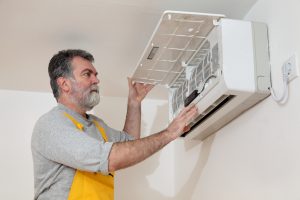Green HVAC Systems: Why You May Want a More Efficient and Environmentally Friendly HVAC System
Did you know that your HVAC system drains more energy dollars than any other system in your home? Considering that the average American household spends at least $2,000 a year on energy bills, according to the U.S. Department of Energy, there’s a lot of room for potential savings when you perform energy-conscious upgrades like green HVAC installation. Here are a few reasons why you may want to make the switch to a more efficient and environmentally friendly HVAC system.
Better for the Environment
Exchanging traditional HVAC systems for Energy Star qualified heating and cooling units can have a positive effect on environment. They use significantly less power than conventional systems, which translates to a reduction in greenhouse gas emissions. Energy Star certified HVAC systems and equipment must meet strict specifications set by the Environmental Protection Agency to ensure that they reduce environmental impact.
Save Money
HVAC installation of a high-performing system can result in hundreds of dollars in savings per year. If you choose an Energy Star certified system, you not only save 445 kWh per year of energy and 685 pounds per year in CO2 emissions, you also enjoy up to $717 in lifetime savings for an average product lifespan of 14 years, according to The Home Depot. By installing a greener, more efficient HVAC system, you may also be eligible for local tax credits, rebates or energy efficiency financing.
Safer, More Comfortable Home
Efficient HVAC systems should be felt and not heard. Typically, a noisy system indicates a lack of return airflow, meaning it has to work harder to pull more air through the ducts. An efficient system should run quietly. If there are rooms in your home that are consistently too hot or too cold or have humidity problems, then these are signs of an inefficient system. If you’re unsure whether or not your system needs replacement, the EPA offers a Home Energy “Yardstick” to compare your household’s energy use to others across the country.
A quality HVAC system can also mean a safer home with improved indoor air quality as a result of better humidity control and more efficient air ventilation and purification.
Customize for Best Performance
High humidity can result in condensation damage and poor air quality. Energy efficient HVAC systems often allow homeowners to set the humidity level for a customized approach to comfort. Look for a Seasonal Energy Efficiency Ratio (SEER) score of 13 to 17. SEER measures the cooling output of the system during a typical season divided by the total electric energy input during the same season, telling you how much energy is used to cool the home during warmer months. Most modern systems also work with a programmable thermostat, which can help homeowners save about $180 every year in energy costs, according to the EPA.
If your HVAC unit is old or inefficient, then it’s time to consider replacing it with an improved system. Cox Heating & Air Conditioning has a team of professionals that can handle your HVAC installation as well as help you repair or maintain the life of your existing system.
Springtime Air Filtration: The Latest in Air Purification Technology for Allergy Sufferers
For allergy sufferers, springtime isn’t simply about the joys of warmer weather. It’s about asthma, hay fever, watery eyes and sinus issues. Seasonal allergies are common, affecting about 50 million people in the U.S., according to the Asthma and Allergy Foundation of America, and poor indoor air quality is one the top five environmental health risks identified by the Environmental Protection Agency. Although you can’t keep yourself in a bubble all season, you can take steps to rid your home’s air of as many allergens as possible using the latest in air purification technology.
Types of Filtration Systems
The two most common types of filtration systems are whole house air filters and portable air filters. Portable filters clean the air in a single room while whole house filters, installed in the HVAC ductwork, can handle an entire home.
Portable systems are pricier, ranging between $50 and $850, with an annual operational cost of up to $200. Whole house filters have a lower upfront cost since they work with existing HVAC systems, but since they require a new filter every one to three months, these costs can add up over a long period of time. Whole house systems must meet certain installation requirements, and, depending on type and size, most cost between $20 and $80.
Types of Air Filters
One way to understand the efficiency of a filter is to look for the minimum efficiency reporting value (MERV) rating, which measures how well it removes airborne particles. MERV scores range from 1 to 20. The higher the score, the better the filtration.
- Fiberglass filters are the most common and comprised of layered fiberglass fibers that trap large particles. These are inexpensive but not the best for allergy sufferers, scoring between 1 and 4 on the MERV scale.
- Polyester and pleated paper filters trap 80 to 95 percent of particles 5 microns and larger. They rate between 8 and 13 on the MERV scale.
- High-efficiency particulate air (HEPA) filters remove 99.97 percent of all particles above 0.3 microns, catching mold spores and even bacteria and viruses. Many HEPA filters have a MERV rating of 14 to 16.
- Electrostatic filters feature self-charging electrostatic cotton/paper fibers that attract and trap small particles using static electricity. There are disposable and permanent options that have MERV ratings that range from 1 to 4.
New Air Filter Technology
These newer filters feature some of the latest air conditioning technology in the industry.
Ultraviolet Air Purifiers
These filters kill airborne particles — including germs and mold — with rays of ultraviolet light that incinerate them as they pass, doing away with traditional filters that need replacement. You can use these pricey systems in either residential HVAC systems or portable purifiers, but be aware that they don’t catch many common allergens such as dust.
Ionic Air Filters
These use negatively charged ions catch even the very smallest air particles, and they are extremely quiet. On the downside, they don’t trap larger irritants like dust, and the ionized particles land on surfaces in the room and can easily find their way back into the air. They also emit ozone, which can irritate sensitive lungs.
What’s Right for You?
Using existing HVAC systems to install a more efficient air purification system is a cost-effective choice if you’re looking to improve your long-term indoor air quality. Choosing the best filter depends on the size and capacity of your HVAC system and your needs as an allergy sufferer. Look for high MERV ratings, and consider the pros and cons of each filter type.
Don’t let allergy season take you by surprise. Get your home springtime ready now. The professionals at Cox Heating & Air Conditioning can work with you to improve your home’s indoor air quality by helping you choose the best air filtration system for your needs.
New Homeowners: What to Look for When Shopping for a Home’s HVAC System
You’ve done it — you’re the proud owner of your very own home! If you’re like most new homeowners, then you’ve probably taken features like the cabinet finishes, countertop materials and plumbing fixtures into consideration during the buying process. But how much do you know about your new home’s hidden costs like heating, ventilation and air conditioning (HVAC) systems? Renters rarely have to deal with HVAC systems, but they’re a major concern for homeowners.
Are you ready to replace or upgrade your HVAC system? We rounded up four pro tips to help make everything from shopping for HVAC systems to HVAC installation less confusing.
1. Know the Basics
Before you start shopping for HVAC systems, it’s helpful to know what you’re shopping for, especially since this is arguably one of the most important systems in your home. Most HVAC installation includes:
- Air Conditioning: The outdoor condensing unit cools the refrigerant, and the indoor component provides the cool air.
- Heat Pumps: These heat and cool your home by cooling warm air during the refrigeration cycle and warming cool air in cold weather.
- Thermostat: Think of this as command central. It lets you switch between heating and cooling, adjust the temperature or turn the system off.
- Ductwork: Cooled air travels from the central air conditioning unit to each room in the house through these pathways.
2. Consider Cooling Efficiency
If you want to save money on your monthly utility bills during the cooling season, the efficiency rating is crucial. The efficiency of the air conditioning component measures in SEER (Seasonal Energy Efficiency Ratio). In 2015, guidelines set 14-SEER as the minimum for most regions of the U.S.
3. Choose Local HVAC Installation Professionals
This may seem like a no brainer, but no one knows what you need better than pros who live in your area. In addition to having the knowledge and expertise about the products, they can also help guide you to choose the best system for your climate. For example, if humidity is a factor, then choosing an HVAC system with a built-in dehumidifier may be a good option.
From buying your first HVAC unit to keeping up with routine maintenance, Cox Heating & Air Conditioning has your HVAC needs covered. Call today at 727-442-6158 or visit coxair.com to learn more about our exacting standards and commitment to providing the best customer service to homeowners across the Tampa area.
7 Signs that Your A/C Unit is on its Last Leg
Your air conditioning unit plays a major role in your comfort, and having an A/C unit you can depend on is the best way to ensure you’re comfortable. When an A/C unit breaks down, sometimes air conditioning repair is all that’s needed to get it up and running again. But other times, your ailing unit could be sending signals that it needs to be replaced. Here are some of the most common issues that indicate it could be time for an upgrade:
Is it Time For an Upgrade?
- The air isn’t cool (or isn’t cool enough) — If your unit isn’t producing enough cold air or if the air it is producing is little better than room temperature, it’s time to consider replacing it.
- It’s not putting out enough airflow — If the unit’s fan stops working or simply slows down, the airflow can weaken considerably, and that means you won’t be getting the most benefits from your unit.
- The unit is making noises — Air conditioners contain plenty of mechanical parts. If you’re hearing unusual sounds coming from your a/c unit, that’s a clear indication it needs to be repaired or replaced.
- The coils are freezing — Your air conditioner’s cooling power depends on the free flow of air around the cooling coils. When a unit gets old, those coils are more likely to become frozen over, which means they’re no longer able to cool the air that’s flowing from your unit.
- Water is leaking from the unit — Leaky water can be difficult to detect, especially if your central A/C unit is sitting on or near soil which can soak up excess water before you even have a chance to notice it. Having your A/C unit maintained every year is the best way to determine if your unit is leaking water so you can determine if a replacement is needed.
- Your electricity bill is very high — Old, worn-out units have to work a lot harder to produce cool air, and that means your electricity bill can be a lot higher.
- Your unit is past its useful life — Like any mechanical system or appliance, an A/C unit has an expected lifespan. Replacing an old unit before it breaks down is the best way to prevent unpleasant surprises.
We’re Here to Help!
Cox Air is a top provider of air conditioning repair services as well as a leading distributor of efficient, state-of-the-art air conditioning units from the most trusted brands. To find out more about the services we offer or to learn about new air conditioning models that can save you money and headaches, fill out our contact form or call us today at 727-442-6158.
Can You Save Energy by Closing Doors?
One of the questions that many HVAC companies get on a regular basis is “can you reduce heating and cooling costs by shutting the doors in your home?” This isn’t a simple question and there are a number of concerns that go into answering it.
When to Buy a New Air Conditioner?
Did you realize that there are better times than others to buy an air conditioner? It may surprise you but yes it is the truth. But realize that there are different times that are beneficial for different buyers. We’ve gathered a few of these together to make it easier for you to decide when to pull the trigger and call someone for HVAC installation.
Things to Consider When Closing Vents in Unused Rooms
Sometimes what appears to be a good idea for saving energy may not work so well. That’s the case when closing forced air heating and air conditioning vents (registers) in unused rooms in your house or commercial building. Instead of helping, this practice may increase utility bills and damage heating ventilation and air conditioning (HVAC) systems.
A home HVAC system generally has one register and one fresh air return per room. If you close the register but leave the return open, the return’s duct creates a suction. It draws in outside air through leaks surrounding exterior doors, windows and electrical outlets. In winter, this means extra cold air to heat. In the summer, the infiltration of extra air increases cooling costs.
Split Air Conditioner vs. Packaged Air Conditioner
When it comes time to upgrade your central air conditioning, knowing the pros and cons of a packaged system and a split system can assist you in deciding which type is install. Armed with the pros and cons of each, you can choose the best type for your home and your needs.
When it comes time to upgrade your central air conditioning, knowing the pros and cons of a packaged system and a split system can assist you in deciding which type is install. Armed with the pros and cons of each, you can choose the best type for your home and your needs.
Which Setting on Your HVAC Fan is Right for Your Home?
Thermostats have been around forever, yet some folks don’t know whether or not to have the HVAC fan continue running after the home has reached its target temperature or not. It’s a choice between “on” and “auto.” Auto means the fan will automatically work only when the air is being cooled or heated. The fan stops once the set temperature is reached. On the flip side, on means that it works 24/7, even after the set temperature has been achieved. So, which setting is right for you?
Benefits of Installing the Air Knight REME
The Air Knight Reme in-duct air purifier is the next generation of indoor air quality technology. Its technology enhances filtration by charging the particulate in the air. As a result, allergens, dust and dander cling together and are much easier to take hostage. Say farewell to mold, pollen and viruses like E. coli and MRSA. It also has an advanced oxidation system to cleanse odors. Say farewell to odors from pets, cooking and diapers. The Air Knight Reme in-duct air purifier is capable of purifying every cubic inch of air indoors. Designed to eliminate sick building syndrome, it’s ideal for commercial space or the indoor home. It’s like bringing the fresh air outdoors indoor without having to open the windows.


















Recent Comments